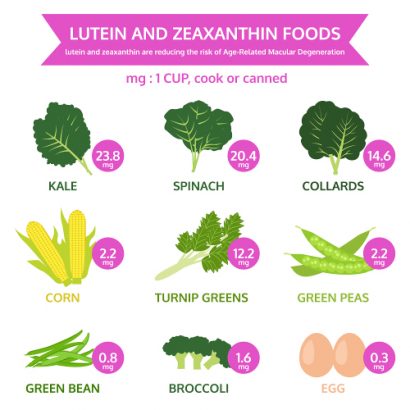2017 – The Year of Carotenoids
Written by Dr. David Evans Last modified on August 6, 2018
A number of years ago, I was involved in the initial research that linked ingestion of lutein (which is highly present in spinach and other green vegetables) with eye health. Technically, lutein is a carotenoid, an organic pigment produced by plants and algae. Carotenoids also make up the macular pigment; the macula being the central part of the eye responsible for high definition vision. The pigment in the macula is what shields the eye from harmful UV rays and provides antioxidant protection. There are more than 600 known carotenoids, but only three present in the eye. These include lutein (which I will call L for simplicity), zeaxanthin (Z) and meso-zeaxanthin (MZ).

Some patients with age-related macular degeneration who were taking lutein supplements actually improved their vision. This improvement was measured by a contrast sensitivity instrument that I invented (the CSV-1000). Contrast sensitivity is the ability to detect low contrast images, unlike the standard E-Chart, which tests how well you can read high-contrast black on white letters. This data was first published more than a decade ago. New research is now showing that when all three of the eye-present carotenoids — L, Z and MZ — are taken as supplements (as opposed to L alone), the results are even better and great things happen.
In addition to macular degeneration patients experiencing amazing vision improvements, there are even some glaucoma patients showing vision recovery. This is big news given that glaucoma has always been associated with irreversible vision loss. New research from the CREST (Central Retinal Enrichment Supplementation Trial) is even showing vision improvements in normal patients, particularly for night vision and under low contrast conditions.
All this leads up to what I think will be a big topic for eye care in 2017: carotenoid supplementation. Your eye doctor may be talking to you more about supplements, even if you don’t have an eye disease, just as a precautionary or protective measure. Researchers are not completely sure how the supplements improve the macula, but it’s clear that they help build up the amount of macular pigment which may help to reduce oxidative stress in the back of the eye. And my gosh we have a lot of oxidative stress in our lives today, from air pollution, to computer eye syndrome (read about this in a post from 2016) to the everyday hustle and bustle.
I hope the carotenoid research and study findings live up to the hype and that we have found a new way to protect and treat our eye health. Expect to hear a lot about it in the news and from your eye doctor.
For those of you more technically inclined, you can review the recent findings from the CREST study here: http://glaucomatoday.com/pdfs/gt0716_industry.pdf
